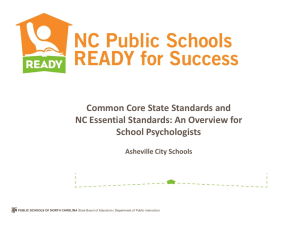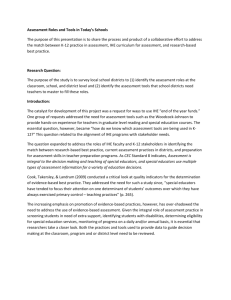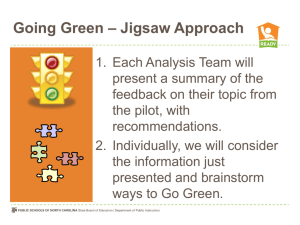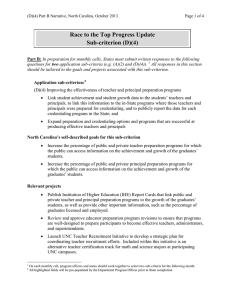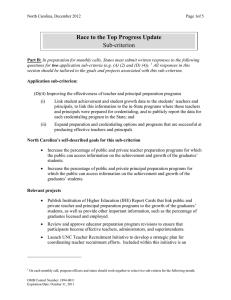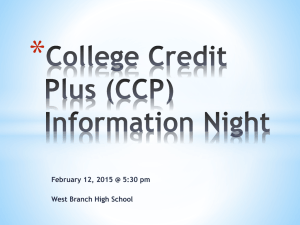CLE.Edits.RESA 2014
advertisement
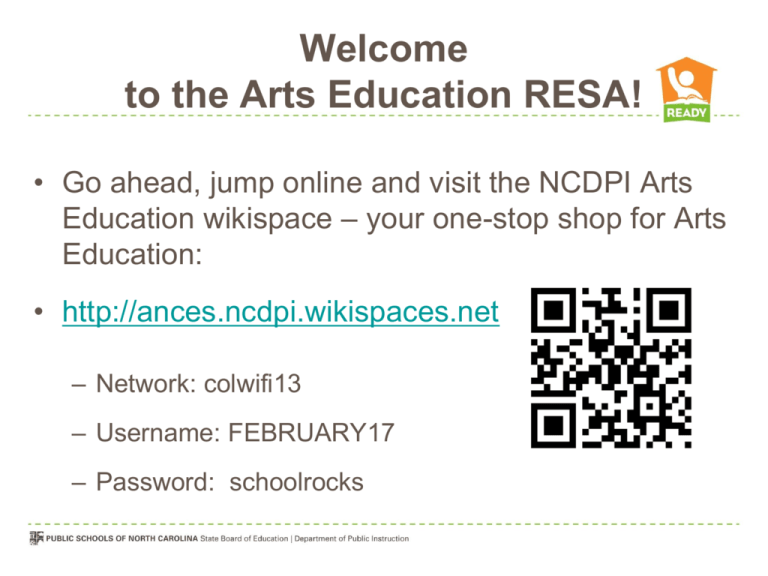
Welcome to the Arts Education RESA! • Go ahead, jump online and visit the NCDPI Arts Education wikispace – your one-stop shop for Arts Education: • http://ances.ncdpi.wikispaces.net – Network: colwifi13 – Username: FEBRUARY17 – Password: schoolrocks North Carolina Live Special Edition: Comprehensive Arts Education Presenters Christie Lynch Ebert Section Chief, K-12 Program Areas Arts Education Consultant (Dance and Music) and NCDPI Liaison to the A+ Schools Program christie.lynchebert@dpi.nc.gov 919-807-3856 Slater Mapp Arts Education Consultant (Theatre Arts and Visual Arts) slater.mapp@dpi.nc.gov 919-807-3758 Opening Monologue and Introductions Talk Show Decorum Take care of your needs Appreciation for one another Exchange ideas freely Influence what we can Opportunity to reflect Unite in purpose Objectives – Recognize the role of the arts in student success – Recognize the components and implementation of Comprehensive Arts Education in schools, school systems, and communities – Understand policy and legislative updates impacting arts education programs in NC Schools – Collaborate with IHE partners around arts integration models and practices, roles, and infrastructures NC Arts Education Wiki and Sign-in http://ances.ncdpi.wikispaces.net/RESA +2014 The Arts and Student Success • Think – pair – share – How do the arts prepare students for success in school, work, and life? (Note: we will continue this conversation with our IHE partners later today) Vision for Arts Education In today’s globally competitive world, innovative thinking and creativity are essential for all school children. High quality, standards-based instruction in the arts develops these skills and effectively engages, retains, and prepares future-ready students for graduation and success in an entrepreneurial economy. Dance, music, theatre arts, and visual arts, taught by licensed arts educators and integrated throughout the curriculum, are critical to North Carolina’s 21st century education. Comprehensive Arts Education • Arts Education – (arts as core, academic subjects) • Arts Integration – (arts as a catalyst for learning across the curriculum) • Arts Exposure – (exposure to arts experiences) Comprehensive Arts Education Brainstorming and Gallery Walk • What does Comprehensive Arts Education look like in your – school, – school system, or – community? Arts Education • Analysis of Student Work • PowerSchool/Homebase – Standards-based grading – 2013-14 and 2014-15 course code updates • National Standards (National Coalition for Core Arts Standards February 17, 2014 Overview of the ASW Process Teacher verifies schedule and chooses objectives for each course Teacher Uploads Evidenc Teacher e collects TAs Collectio of student n to work Online Platform Reviewers rate Evidence Collections Teacher receives category rating for Standard 6 ASW 2014 Pilot Participants Over 1100 NC Educators Representing Regions 8 Advanced Placement Arts Education Healthful Living International Baccalaureate Content Areas Occupational Preparation 7th Grade Social Studies World History World Languages ASW Wikispace • Pilot Training Modules • Important Forms • Frequently Asked Questions Visit the Wiki here: http://ncasw.ncdpi.wikispaces.net/ ASW Contact Information If you have questions about the ASW Process, please contact Jennifer DeNeal, RttT Project Coordinator for Educator Effectiveness at EducatorEffectiveness@dpi.nc.gov Pilot Training Modules Important Forms Course Code Updates • 2013-14 Course Codes have been aligned with PowerSchool • Standards-based grading practices are being explored/implemented by LEAs • 2014-15 Course Codes will differentiate each grade level (K-8); HS courses remain the same National Standards •National Coalition for Core Arts Standards (NCCAS) Wiki: https://nccas.wikispaces.com/Home National Standards Visual Arts Theatre Arts Media Arts Dance Music NCCAS • The final public review of the National Core Arts Standards drafts is Feb. 14-28, 2014 – NC Focus Group Webinar: 2/27/14 (3:30-4:30pm) • Full release in June 2014 Arts Integration • Fitting it the Pieces Together • 115-C-296 • Activity LUNCH North Carolina Live Special Edition: Comprehensive Arts Education (Afternoon Session with IHEs) Objectives – Recognize the components and implementation of Comprehensive Arts Education in schools, school systems, and communities – Understand policy and legislative updates impacting arts education programs in NC Schools – Collaborate with IHE partners around arts integration models and practices, roles, and infrastructures Facilitators (Hosts) Rachel A. McBroom, Ph.D. Christie Lynch Ebert NC Dept. of Public Instruction Director, Educator Preparation rachel.mcbroom@dpi.nc.gov 919-817-8848 NC Dept. of Public Instruction Section Chief, K-12 Programs and NCDPI Liaison to the A+ Schools Program christie.lynchebert@dpi.nc.gov 919-807-3856 Christy Chenausky Appalachian State University Director of Arts Education and Outreach chenauskyc@appstate.edu 828-262-6084 (Ext. 109) Banu Valladares NC Arts Council Arts in Education Director banu.valladares@ncdcr.gov 919-807-6502 Slater Mapp NC Dept. of Public Instruction Arts Education Consultant slater.mapp@dpi.nc.gov 919-807-3758 NC Arts Education Wiki and Sign-in http://ances.ncdpi.wikispaces.net/RESA +2014 Context for Arts Integration • Top 10 List: Benefits of an Arts Education (School, Work, and Life) Setting the Stage Policy and Legislation •Basic Education Program (§ 115C-81) The NC Standard Course of Study Common Core State Standards NC Essential Standards NC Standard Course of Study • Common Core State Standards – English Language Arts (and Literacy in History/Social Studies, Science, and Technical Subjects) • NC Essential Standards – Arts Education – Career and Technical Education – English Language Development* – Guidance* – Healthful Living (Health & Physical Education) – Information and Technology* – Mathematics – Science – Social Studies – World Languages S66 Vision for Arts Education In today’s globally competitive world, innovative thinking and creativity are essential for all school children. High quality, standards-based instruction in the arts develops these skills and effectively engages, retains, and prepares future-ready students for graduation and success in an entrepreneurial economy. Dance, music, theatre arts, and visual arts, taught by licensed arts educators and integrated throughout the curriculum, are critical to North Carolina’s 21st century education. S66 Comprehensive Arts Education • Arts Education – (arts as core, academic subjects) • Arts Integration – (arts as a catalyst for learning across the curriculum) • Arts Exposure – (exposure to arts experiences) Comprehensive Arts Education G.S. 115C-296: Arts Integration • Requires that preservice elementary teachers are prepared to “integrate the arts across the curriculum”. • Outgrowth of H758 Arts Education Commission • Wide-scale education legislation – S724 (June 2012) – H23 (March 2013) – S168 (July 2013) 115C-296 Public School Law • Supported by: – Existing Teacher Ed Requirements (Policy) – NC Teacher Evaluation (Policy) – Previous Legislation – National Reports Existing Policy State Board Policy TCP-B-002 Standard 6 of the Teacher Specialty Standards (2009), requires that elementary grades teacher candidates are “knowledgeable in and are able to design and implement learning tasks that demonstrate: 1)a general knowledge of the fundamentals of music, dance, theatre, and/or visual arts; and 2)the ability to create interdisciplinary lessons/units that integrate the content areas with the arts to enhance classroom instruction and student learning.” State Board Policy TCP-B-002 Standard 5 of the Birth-Kindergarten specialty standard (2009): •B-K teacher candidates “create and adapt environments and intentionally plan and implement an integrated curriculum that facilitates every child’s construction of knowledge and provides a strong foundation for lifelong learning.” •In the Emergent Creative Arts, B-K teacher candidates must: 1. facilitate children’s creative expression through dance/creative movement, drama, music, and visual arts; 2. use the arts to represent ideas; State Board Policy TCP-B-002 • (continued) In the Emergent Creative Arts, B-K teacher candidates must: 3. help children learn about and appreciate a variety of art forms and artists; 4. integrate the arts to support learning in all content areas (including cultural diversity); and 5. apply creativity to problem solving, risk-taking, and critical thinking. Teacher Evaluation Process (2009) Teachers recognize the interconnectedness of content areas/disciplines Standard III, Element C “Teachers understand how the content they teach relates to other disciplines in order to deepen understanding and content learning for students.” NC Pre-service Arts Integration Initiative NC PAII - Goals • Support the preparation of pre-service educators to deliver a balanced education. • Identify models and practices to prepare pre-service educators to integrate the arts. • Foster collaborations to create access to a comprehensive arts education in our state. Committee • Diverse, state-level • Representation from: – IHEs (Education and Arts Education) – Arts Educators – Administrators (principal, superintendent) – Community Partners Committee’s Work • Review reported data from IHEs on how they currently prepare educators to integrate the arts. Identify trends and gaps in that reporting. Find ways to dig deeper into researching what IHEs are doing and how well it works. • Identify models and/or practices that help move forward this statewide conversation. Committee Members Jennifer Buelin-Biesecker Liz Grimes-Droessler NC State University Teaching Assistant Professor, STEM jkbuelin@ncsu.edu (919) 515-1741 Wake County Public Schools Senior Administrator for Arts Education egrimes-droessler@wcpss.net (919) 431-7654 Rick Cary Dr. Anthony Jackson Mars Hill College Professor of Art; Chair, Fine Arts RCary@mhu.edu (828) 689-1396 Nash-Rocky Mount Public School Superintendent adjackson@nrms.k12.nc.us (252) 462-2511 Donna Dragon UNC Charlotte Assistant Professor of Dance ddragon@uncc.edu (704) 687-0832 Committee Members Frances Page Courtney Reilly Meredith College Professor of Music; Dept Head, Communication and Performing Arts UNC Wilmington Assistant Director of Cultural Arts reillyce@uncw.edu (910) 962.2082 pagef@meredith.edu (919) 760-8575 Melinda Waegerle, MA Brenda Reese Freedom Trail Elementary School (A+) Principal brendacreese@averyschools.net (828) 733-4744 UNC Greensboro Assistant Professor, Dance, A+ Fellow mhwaeger@uncg.edu (336) 334-5570 Current Practices IHE Reporting (2009-2013) Integrated Arts, Arts in the Elementary Classroom, Arts and the Young Child, Survey of Arts • Varies 1-4 hour course, depending on IHE • Basic introduction to arts disciplines • Includes some training in planning cross-curricular lessons that integrate the arts Arts Methods Courses • Focused on one particular art form (e.g. integrating music in the elementary classroom) • Often limited to only one or two disciplines • Sometimes mixed with arts and elementary ed. majors • May be stand alone or combined with integrated arts course Literacy and the Arts • Usually literacy within a particular art form (art, music) • Sometimes mixed with arts and general ed. students • Taught through the arts discipline IHE Reporting (2009-2013) Language Arts and Creative Expression Labs or Practicum Arts-Specific Coursework • Language Arts Methods course that includes /embeds the arts • Taught by LA instructor • Some IHEs require a 1-hour lab in “the arts” • May be stand alone, or combined with other requirements, such as language arts and creative expression course • May require students to take one or more courses in a specific arts discipline (as a stand alone, or in addition to integrated arts coursework) • Most do not include methods or pedagogy for integrating arts into teaching practice Planning • IHE Planning Template – IHE members discuss practices within their institutions and use planning template to set the course for needs assessment and future directions – Arts Education Leaders work with IHE members to discuss current and possible practices, resources, etc. for current and potential models Arts Education for All Students Coffee Talk • How do these roles work together to benefit students? • What does this model look like in your setting? Arts Affirmation Evaluation and Future Directions What worked well Suggestions for improvement RESA Evaluation http://go.ncsu.edu/ncdpi-resa_survey “The digital tools used during the course of this training have been helpful to some educators across the state. However, due to the rapidly changing digital environment, NCDPI does not represent nor endorse that these tools are the exclusive digital tools for the purposes outlined during the training.”
